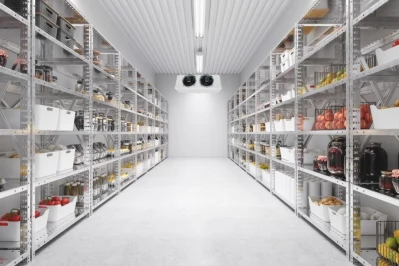
Dalam dunia kuliner dan pengobatan alami, penggunaan berbagai jenis herbal adalah hal yang umum. Namun, untuk menjaga kualitas dan kegunaan herbal, penting untuk memiliki penyimpanan yang tepat. Cold storage atau penyimpanan dingin adalah solusi yang sangat efektif untuk menjaga kesegaran herbal.
Herbal seperti daun mint, basil, dan rosemary sering digunakan dalam berbagai hidangan dan obat-obatan. Namun, herbal ini cenderung memiliki umur simpan yang pendek dan dapat kehilangan kualitasnya jika tidak disimpan dengan benar. Cold storage memungkinkan herbal tetap segar dan tahan lama.
Cold storage adalah ruangan terisolasi dengan suhu yang dapat diatur secara tepat. Ini memungkinkan herbal disimpan pada suhu rendah yang menghambat pertumbuhan bakteri dan menjaga kualitasnya. Ketika disimpan dalam cold storage, herbal dapat bertahan lebih lama daripada jika disimpan pada suhu kamar.
Selain itu, cold storage juga mengontrol kelembaban udara, yang sangat penting untuk menjaga herbal tetap segar. Kelembaban yang tepat dapat menghindari herbal menjadi terlalu kering atau terlalu lembap, yang dapat merusak kualitasnya.
Dengan penyimpanan dingin yang tepat, herbal dapat digunakan dalam berbagai hidangan atau obat-obatan dengan kualitas yang terjaga. Ini membuat cold storage menjadi pilihan terbaik bagi bisnis kuliner dan pengobatan alami yang mengandalkan herbal dalam produk-produk mereka.
Cold storage for herbs is a critical component of preserving the flavor, aroma, and nutritional value of these delicate culinary and medicinal plants. Herbs are renowned for their fragrant and savory qualities, which can be quickly compromised if not stored correctly. In this article, we'll explore the importance of cold storage for herbs, the best practices for preserving their quality, and the benefits it offers to both home cooks and commercial producers.
Preserving Freshness with Cold Storage for Herbs
Herbs are known for their volatile oils, which contain the compounds responsible for their distinct flavors and aromas. However, these oils are highly sensitive to heat, humidity, and light, which can cause them to degrade rapidly. Cold storage provides an effective solution to slow down this degradation process and extend the shelf life of herbs.
By maintaining herbs at a low temperature, typically just above freezing (around 32°F or 0°C), cold storage helps preserve the volatile oils, colors, and textures that make herbs so appealing. This temperature range inhibits the growth of mold, yeast, and bacteria while reducing enzymatic reactions that lead to spoilage.
Best Practices for Cold Storage of Herbs
-
Temperature Control: As mentioned, herbs should be stored at temperatures just above freezing. The ideal range is typically between 32°F to 40°F (0°C to 4°C). This prevents freezing, which can damage the cell structure of herbs.
-
Humidity Management: Herbs are also sensitive to humidity levels. Ideally, you should maintain humidity levels between 90% and 95% to prevent wilting and drying out. You can achieve this by using humidity-controlled storage or placing herbs in plastic bags with small holes to maintain moisture.
-
Packaging: Herbs should be stored in airtight containers or resealable plastic bags to minimize exposure to air, which can cause herbs to lose their flavor and aroma.
-
Avoid Condensation: When removing herbs from cold storage, allow them to come to room temperature before using them to prevent condensation, which can lead to mold growth.
-
Light Exposure: Store herbs away from direct light, as exposure to UV rays can lead to the degradation of essential oils and a loss of flavor and color.
Benefits of Cold Storage for Herbs
-
Extended Shelf Life: Cold storage significantly extends the shelf life of herbs, allowing consumers to enjoy fresh flavors and aromas for an extended period.
-
Cost Savings: For commercial herb producers, cold storage can reduce waste and financial losses due to spoilage, leading to cost savings.
-
Year-Round Availability: Cold storage enables the preservation of fresh herbs even when they are out of season, ensuring a year-round supply for both consumers and businesses.
-
Enhanced Culinary Experience: Home cooks and chefs benefit from cold storage as they can maintain a diverse selection of fresh herbs, elevating the quality of their dishes.
In conclusion, cold storage for herbs is a game-changer in maintaining the integrity of these flavorful and aromatic plants. Whether you're a home cook looking to add a burst of freshness to your meals or a commercial herb producer aiming to reduce waste and meet year-round demand, proper cold storage techniques are essential. By following best practices and controlling temperature and humidity, you can unlock the full potential of herbs, enhancing the taste and appeal of your culinary creations.
BJT as a professional cold storage company dedicate Cold storage for herbs or anythings tradtional medicine, is an important tool for preserving the quality and freshness of various types of foods, including herbs. Herbs are highly perishable and can quickly lose their flavor, aroma, and nutrient content if not stored properly. Cold storage can help extend the shelf life of herbs and maintain their quality for longer periods of time.
When it comes to storing herbs, it is important to keep them at a cool and dry temperature, away from direct sunlight and moisture. A cold storage room can be an ideal solution for storing herbs, as it provides a controlled environment with a consistent temperature and humidity level.
The ideal temperature for storing herbs is between 0°C to 5°C (32°F to 41°F). This temperature range can help slow down the growth of bacteria, mold, and other microorganisms that can cause spoilage and deterioration of the herbs. A cold room can be adjusted to maintain this temperature range and keep the herbs fresh and flavorful.
In addition to temperature control, a cold room can also offer other benefits for storing herbs. For example, it can provide protection against pests and insects that can damage or contaminate the herbs. It can also help prevent exposure to oxygen and light, which can degrade the quality of the herbs.
Overall, cold storage is an essential tool for businesses that deal with herbs, such as restaurants, spice shops, and herbal medicine manufacturers. It can help ensure the quality and safety of the herbs and prevent waste and spoilage.
COLD STORAGE FOR STORAGE HERBS
Herbs are plants that are used for culinary, medicinal, and aromatic purposes. These plants are known for their unique flavors, aromas, and health benefits. Some common examples of herbs include basil, thyme, rosemary, parsley, sage, and cilantro.
Herbs have been used for thousands of years for their medicinal properties. For example, ginger is known for its ability to reduce inflammation, while chamomile is often used to promote relaxation and improve sleep. Many herbs also have antioxidant properties, which help to protect the body against damage from free radicals.
In addition to their health benefits, herbs are also widely used in cooking. They can be used fresh or dried, and they add flavor and depth to a wide range of dishes. For example, basil is a key ingredient in Italian cuisine, while thyme is often used in French cuisine. Many herbs are also used to make teas, which are believed to have a range of health benefits.
When it comes to storing herbs, it's important to keep them in a cool, dry place to prevent them from spoiling. A cold storage room or refrigerator can be a good option for storing fresh herbs, as they will stay fresh for longer in these conditions. Dried herbs can be stored in an airtight container in a cool, dark place for up to a year.
